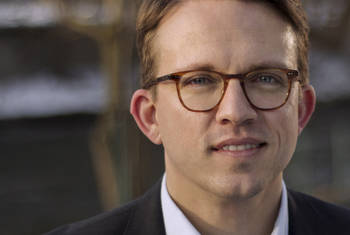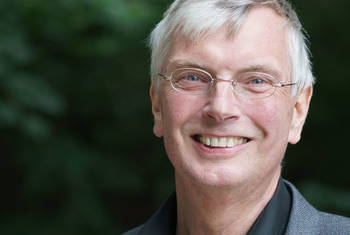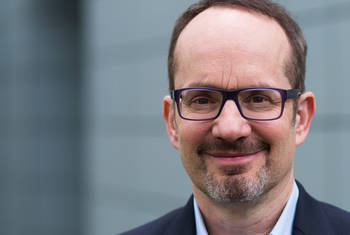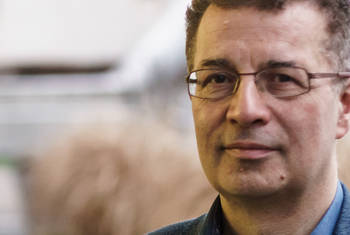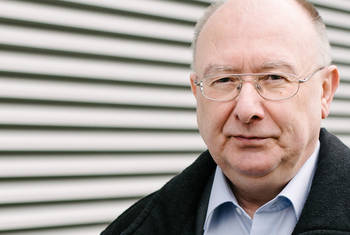Angela D. Friederici Is Language Development in the Child’s Brain Visible on a Molecular Level?
Angela D. Friederici is a member of the Max Planck Institute for Human Cognitive and Brain Sciences in Leipzig. Friederici holds an Honorary Professorship in Psychology at Leipzig University, in Linguistics at the University of Potsdam and in Medicine at the Charité Berlin. Since 2014, Friederici is the Vice-President of the Max Planck Society. Friederici’s field of expertise is psycholinguistics. Through her interdisciplinary training, she is looking at the representation of language in the brain and how this relates to the overall learning process.
Area of Research
Neuropsychology, Linguistics
since 1994
Founding Director
Max Planck Society (more details)
Max Planck Institute for Human Cognitive and Brain Sciences
since 2014
Vice-President
Max Planck Society (more details)
since 2014
Scientific Member
Berlin-Brandenburg Academy of Sciences
since 2011
Member
The German National Academy of Sciences Leopoldina
Working Group Early Socialization: Biological, Psychological, Sociological and Economic Perspectives
since 2004
Honorary Professor
Charité - University Medicine Berlin (Charité - Universitätsmedizin Berlin)
Neurology Department
since 2003
Member of the Health Research Council
German Federal Ministry of Education and Science (BMBF)
since 2000
Member of the Scientific Council
Friedrich Schiller University Jena (Friedrich-Schiller-Universität Jena)
since 1997
Honorary Professor for Neuropsychology of Language
University of Potsdam (Universität Potsdam)
Faculty of Philosophy
since 1995
Honorary Professor for Cognitive Neuropsychology
Leipzig University (Universität Leipzig)
2012-2015
Chair of the Scientific Committee
Einstein Foundation Berlin
2011-2012
Vice-Chair of the Scientific Committee
Einstein Foundation Berlin
2010-2016
Committee for the Examination of the Management Functions of Scientific Members
Max Planck Society (more details)
2009-2010
Vice-Chair of the Committee of Non-University Research Institutions in Health Research
German Federal Ministry of Education and Science
2006-2009
Member of the Senate Committee for Research Planning
Max Planck Society (more details)
2006-2009
Chair of the Scientific Council
Max Planck Society (more details)
2005-2007
Vice President
Berlin-Brandenburg Academy of Sciences
2002-2009
Member of the Senate
Max Planck Society (more details)
1999-2000
Member
State Council for the Universities in the State of Brandenburg, Germany
1997-2007
Managing Director of the Centre of Cognitive Sciences
Leipzig University (Universität Leipzig)
Center of Advanced Study
1996-2007
Director of the Centre for Cognitive Sciences
Leipzig University (Universität Leipzig)
Centre for Advanced Study
1996-2001
Member of the Senate
German Research Foundation
1994-1998
Member of the Executive Committee
Berlin Brandenburg Academy of Sciences
1993-1994
Managing Director
Free University of Berlin (Freie Universität Berlin)
Institute of Psychology
1991-1994
Full Professor for Psychology
Free University of Berlin (Freie Universität Berlin)
1989-1991
Full Professor for Cognitive Psychology
Free University of Berlin (Freie Universität Berlin)
1988
Research Fellow
University of California, San Diego
Center for Cognitive Science
1984-1985
Research Fellow
Paris Descartes University (Université Paris René Descartes)
Laboratoire de Psychologie Expérimentale
1987-1989
1979-1986
1978-1979
Postdoctoral Fellow
Massachusetts Institute of Technology (MIT)
Department of Psychology
1978-1979
Postdoctoral Fellow
Boston University School of Medicine
Medical Center and Department of Neurology
1974-1978
Research Assistant
Rheinische Landesklinik für Sprachgestörte, Bonn, Germany
1986
Habilitation in Psychology
Justus Liebig University Giessen (Justus-Liebig-Universität Gießen)
Thesis "Cognitive Structures of Language Comprehension: Processes and Strategies"
1980
Diploma in Psychology
University of Bonn (Rheinische Friedrich-Wilhelms-Universität Bonn)
1976
PhD in Linguistics
University of Bonn (Rheinische Friedrich-Wilhelms-Universität Bonn)
- BMC Neuroscience
- Brain
- Brain and Cognition
- Brain and Language
- Brain Research
- Cerebral Cortex
- Cortex
- Child Development
- Cognition
- European Journal of Neuroscience
- Experimental Brain Research
- International Journal of Psychophysiology
- Journal of Child Psychology and Psychiatry
- Journal of Cognitive Neuroscience
- Journal of Experimental Child Psychology
- Journal of Memory and Language
- Journal of Neuroscience
- Nature Neuroscience
- Neural Networks
- NeuroImage
- Neuron
- Neuropsychologia
- Neuroscience Letters
- Neuroscientist
- Perceptual Motor Skills
- PLoS One
- Proceedings of the National Academy of Sciences
- Psycholinguistic Research
- Psychophysiology
- Trends in Cognitive Sciences
- Academia Europaea
- Academy of Aphasia
- Berlin-Brandenburg Academy of Sciences
- Cognitive Neuroscience Society
- Deutsche Gesellschaft für Neurotraumatologie und Klinische Neuropsychologie
- Deutsche Gesellschaft für Psychologie
- European Brain Council
- European Neuroscience Association
- European Society of Cognitive Psychology
- German Academy of Sciences 'Leopoldina' (since 2008 Germany's National Academy of Sciences)
- German Neuroscience Society
- Gesellschaft für Kognitionswissenschaft
- International Neuropsychological Society
- International Neuropsychological Symposium
- Society for Neuroscience
Prizes
- Carl Friedrich Gauss-Medal of the Brunswick Scientific Society (2011)
- Doctor Honoris Causa, University of Mons, Mons, Belgium (2011)
- Johannes Gutenberg University Mainz, Germany: Johannes Gutenberg Endowed Professorship (2010)
- Gottfried Wilhelm Leibniz Prize of the German Research Foundation (1997)
- Alfried Krupp Prize for Young Scientists of the Alfried Krupp von Bohlen and Halbach Foundation (1990)
- Heisenberg Award of the German Research Foundation (1987-1989)
Fellowships
- Fellowship at Center for Advanced Study in the Behavioral Sciences at Stanford University, Stanford, USA (2010-2011)
- Elected Member, Academia Europaea (2007)
- Elected Member, German Academy of Sciences 'Leopoldina' (since 2008 Germany's National Academy of Sciences) (2000)
- DaimlerChrysler Scholarship at the Institute for Advanced Studies in Berlin (1999)
- Elected Member, Berlin-Brandenburg Academy of Sciences (1993)
- Max Planck Research Fellowship of the Max Planck Society (1979-1981)
- ERC Advanced Grant, European Research Council (2011)
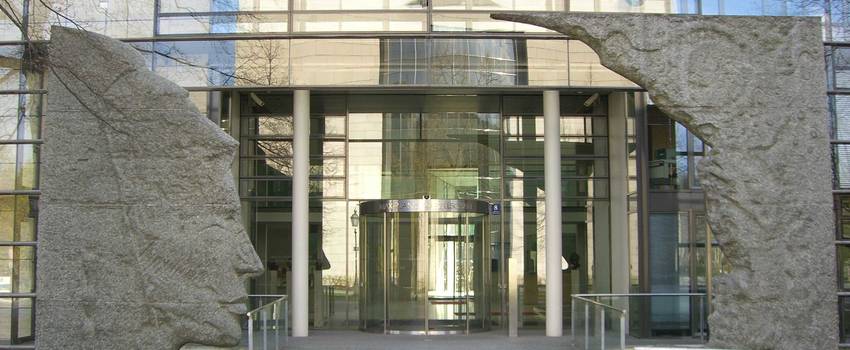 © Maximilian Dörrbecker
© Maximilian Dörrbecker
Max Planck Society
"The Max Planck Society is Germany's most successful research organization. Since its establishment in 1948, no fewer than 18 Nobel laureates have emerged from the ranks of its scientists, putting it on a par with the best and most prestigious research institutions worldwide. The more than 15,000 publications each year in internationally renowned scientific journals are proof of the outstanding research work conducted at Max Planck Institutes – and many of those articles are among the most-cited publications in the relevant field." (Source)
Institute
Max Planck Institute for Human Cognitive and Brain Sciences
The aim of the Max Planck Institute for Human Cognitive and Brain Sciences in Leipzig is to investigate human cognitive abilities and brain processes. The main focus of the research is on the neuronal basis of higher functions of the brain such as speech, music, and action. To this end, the scientists’ primary interest focuses on how these are perceived, processed, planned, and generated, as well as how perception and generation influence each other. They also investigate the plastic changes to the brain after strokes, and how these affect different cognitive abilities. The Department of Neurophysics, which was established in early 2007, is specifically concerned with the use and development of imaging methods for the neurosciences. (Source)
Map
The ability to process complex syntax is a human characteristic. The development of language comprehension and articulation takes place over a certain period of time during childhood. What happens in the brain on a neural biological level during language acquisition is still unclear. The research explained in this video uses methods that detect and monitor brain activity to determine changes and patterns on the scale of milliseconds. This allows to see maturation and to follow connections between different brain areas, helping our understanding of where language develops. ANGELA D. FRIEDERICI illustrates that she and her fellow researchers found a particular fiber track which connects two regions of the brain and is responsible for syntax comprehension. While most animals do not have this fiber track or only a less developed one, the question of language representation can also be expanded as an example of learning processes in the brain in general. The research proves that brain development determines what is possible in terms of learning at the defined moment in life.
LT Video Publication DOI: https://doi.org/10.21036/LTPUB10303
The Ontogeny of the Cortical Language Network
- Michael A. Skeide and Angela D. Friederici
- Nature Reviews Neuroscience
- Published in 2016





